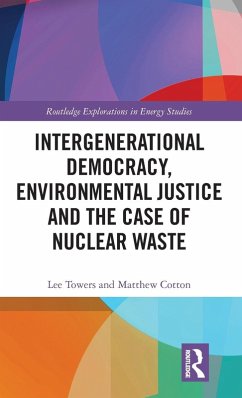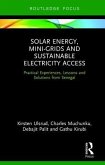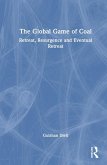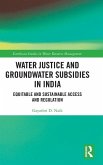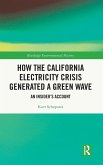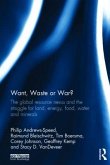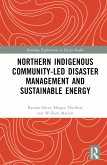Lee Towers, Matthew Cotton
Intergenerational Democracy, Environmental Justice and the Case of Nuclear Waste
Lee Towers, Matthew Cotton
Intergenerational Democracy, Environmental Justice and the Case of Nuclear Waste
- Gebundenes Buch
- Merkliste
- Auf die Merkliste
- Bewerten Bewerten
- Teilen
- Produkt teilen
- Produkterinnerung
- Produkterinnerung
This book explores the interplay between intergenerational justice and intra-generational justice using nuclear waste management as a consistent case to explore these themes.
Andere Kunden interessierten sich auch für
![Solar Energy, Mini-grids and Sustainable Electricity Access Solar Energy, Mini-grids and Sustainable Electricity Access]() Kirsten UlsrudSolar Energy, Mini-grids and Sustainable Electricity Access81,99 €
Kirsten UlsrudSolar Energy, Mini-grids and Sustainable Electricity Access81,99 €![The Global Game of Coal The Global Game of Coal]() Gulshan DietlThe Global Game of Coal202,99 €
Gulshan DietlThe Global Game of Coal202,99 €![Water Justice and Groundwater Subsidies in India Water Justice and Groundwater Subsidies in India]() Gayathri D NaikWater Justice and Groundwater Subsidies in India194,99 €
Gayathri D NaikWater Justice and Groundwater Subsidies in India194,99 €![How the California Electricity Crisis Generated a Green Wave How the California Electricity Crisis Generated a Green Wave]() Kurt SchuparraHow the California Electricity Crisis Generated a Green Wave202,99 €
Kurt SchuparraHow the California Electricity Crisis Generated a Green Wave202,99 €![Want, Waste or War? Want, Waste or War?]() Philip Andrews-SpeedWant, Waste or War?206,99 €
Philip Andrews-SpeedWant, Waste or War?206,99 €![Regional Energy Transitions in Australia Regional Energy Transitions in Australia]() Regional Energy Transitions in Australia76,99 €
Regional Energy Transitions in Australia76,99 €![Northern Indigenous Community-Led Disaster Management and Sustainable Energy Northern Indigenous Community-Led Disaster Management and Sustainable Energy]() Ranjan DattaNorthern Indigenous Community-Led Disaster Management and Sustainable Energy180,99 €
Ranjan DattaNorthern Indigenous Community-Led Disaster Management and Sustainable Energy180,99 €-
-
-
This book explores the interplay between intergenerational justice and intra-generational justice using nuclear waste management as a consistent case to explore these themes.
Hinweis: Dieser Artikel kann nur an eine deutsche Lieferadresse ausgeliefert werden.
Hinweis: Dieser Artikel kann nur an eine deutsche Lieferadresse ausgeliefert werden.
Produktdetails
- Produktdetails
- Verlag: Taylor & Francis
- Seitenzahl: 190
- Erscheinungstermin: 7. Oktober 2024
- Englisch
- Abmessung: 216mm x 140mm x 13mm
- Gewicht: 381g
- ISBN-13: 9781032728018
- ISBN-10: 1032728019
- Artikelnr.: 70733859
- Herstellerkennzeichnung
- Libri GmbH
- Europaallee 1
- 36244 Bad Hersfeld
- gpsr@libri.de
- Verlag: Taylor & Francis
- Seitenzahl: 190
- Erscheinungstermin: 7. Oktober 2024
- Englisch
- Abmessung: 216mm x 140mm x 13mm
- Gewicht: 381g
- ISBN-13: 9781032728018
- ISBN-10: 1032728019
- Artikelnr.: 70733859
- Herstellerkennzeichnung
- Libri GmbH
- Europaallee 1
- 36244 Bad Hersfeld
- gpsr@libri.de
Lee Towers is a postdoctoral researcher working at Teesside University looking into aspects of intra- and intergenerational justice and nuclear waste solutions. He holds a PhD in applied social sciences from Brighton University. This PhD explored energy justice with a focus on community energy organisations and their work on energy poverty and climate mitigation in the United Kingdom. Previous published work includes an examination of community energy work on reducing energy poverty in the UK privatised energy system and an exploration of the intergenerational aspects of the pandemic published by Brighton University. His current postdoctoral position is funded by the Nuclear Waste Services. Matthew Cotton is professor of environmental justice and public policy in the School of Social Sciences, Humanities, and Law at Teesside University. He holds a PhD in environmental science from the University of East Anglia. His research explores the social and ethical dimensions of technology development and environmental planning, and the effective involvement of stakeholders in questions of socio-economic and ecological justice. His previous published works on these topics include the monographs: Virtual Reality, Empathy and Ethics; Nuclear Waste Politics (Routledge); and Ethics and Technology Assessment; and co-edited volumes: Governing Shale Gas (Routledge) and Engaging Environmental Justice. His research in the field of environmental justice is funded by Nuclear Waste Services; Research England; The Economic and Social Research Council; Euratom; The Foreign, Commonwealth and Development Office; and the National Institute for Public Health Research.
Introduction
Defining Intergenerational Justice
Three Features of Intergenerational Justice
Children as Proxies of Future Generations
Indigenous Societies and the World System
Humanity, Ethnoclass, Ability, Gender, and Sexuality
Book Outline
Part One - Intergenerational justice dilemmas
Chapter 1: The philosophical challenge of intergenerational justice
Philosophical challenges and concepts in intergenerational justice
Can future people have rights? The non-identity problem
What obligations do we hold to future generations? The problem of
reciprocity
The weighting of future obligations - the issue of social discounting
Sufficientarianism, or is enough, enough?
Environmental Rights
Ontological challenges
Conclusions
Chapter 2: Alternative philosophical traditions
Social Relations of the Gift
Indigenous Perspectives on Justice and Time
Defining the Human Across Deep Time
The Over-determination of Man
Conclusions - a new/old subjectivity for intergenerational justice
Chapter 3: Mainstream Economics and Scarce Justice
Generational Wealth Transfers
Trading Justice
The Economics of the Anthropocene
Conclusions
Chapter 4: Abundant Justice and Democracy
Intergenerational Dilemmas
Children and Young People as Future Generational Proxies
Intergenerational Democracy
Media Framings of Youth Protestors
Youth as Proxies
The UN Convention on the Rights of Children
The Intergenerational Capability Approach
Future Studies, Decoloniality, and Backcasting
Mainstream Future Studies
Backcasting Decolonised?
Conclusions
Part Two - Nuclear Waste and Intergenerational Democracy
Chapter 5: Critical Nuclear Concepts
Nuclear Landscapes & Communities
Peripheralisation
Energopower
Nuclear Colonialism
Conclusions
Chapter 6: Canada and the Nuclear Waste Management Organisation
Context and Histories
NWMO - Aims, Scope and Assumptions
The Search for a GDF Site and Implementation
Conclusions
Chapter 7: The World's First GDF - Finland
Context and History
Aims, Scope and Assumptions of NWMOs in Finland
STUK
TVO & Fortum
Posiva
Shared Assumptions
Implementation of the Most Advanced GDF in the World
Finland's Search for a GDF
Media Representations and Consumption
Intragenerational and Intergeneration Justice and Finland's GDF
Conclusions
Chapter 8: The United Kingdom and Nuclear Power and Waste
Context and history of nuclear technologies in the United Kingdom
Period one - Economic and Military Securitisation
Period 2. Nuclear energy expansion and the recognition of waste as an
environmental concern
Period 3. The Deliberative Turn
Period 4. Climate change securitisation
Current UK Nuclear Waste Policy
Implementation of the GDF
Expanding Costs and Expanding Inventories
Democratic Deficits and the Nuclear
Conclusion
Conclusion: Justice for All
Nuclear Waste Management and Justice
Distributional Justice
Procedural Justice
The Justice of Recognition
The Justice of Redress and Reparation
Ghosts of Seppo and Western Science
The Darkness of the Grave or the Womb?
References
Index
Defining Intergenerational Justice
Three Features of Intergenerational Justice
Children as Proxies of Future Generations
Indigenous Societies and the World System
Humanity, Ethnoclass, Ability, Gender, and Sexuality
Book Outline
Part One - Intergenerational justice dilemmas
Chapter 1: The philosophical challenge of intergenerational justice
Philosophical challenges and concepts in intergenerational justice
Can future people have rights? The non-identity problem
What obligations do we hold to future generations? The problem of
reciprocity
The weighting of future obligations - the issue of social discounting
Sufficientarianism, or is enough, enough?
Environmental Rights
Ontological challenges
Conclusions
Chapter 2: Alternative philosophical traditions
Social Relations of the Gift
Indigenous Perspectives on Justice and Time
Defining the Human Across Deep Time
The Over-determination of Man
Conclusions - a new/old subjectivity for intergenerational justice
Chapter 3: Mainstream Economics and Scarce Justice
Generational Wealth Transfers
Trading Justice
The Economics of the Anthropocene
Conclusions
Chapter 4: Abundant Justice and Democracy
Intergenerational Dilemmas
Children and Young People as Future Generational Proxies
Intergenerational Democracy
Media Framings of Youth Protestors
Youth as Proxies
The UN Convention on the Rights of Children
The Intergenerational Capability Approach
Future Studies, Decoloniality, and Backcasting
Mainstream Future Studies
Backcasting Decolonised?
Conclusions
Part Two - Nuclear Waste and Intergenerational Democracy
Chapter 5: Critical Nuclear Concepts
Nuclear Landscapes & Communities
Peripheralisation
Energopower
Nuclear Colonialism
Conclusions
Chapter 6: Canada and the Nuclear Waste Management Organisation
Context and Histories
NWMO - Aims, Scope and Assumptions
The Search for a GDF Site and Implementation
Conclusions
Chapter 7: The World's First GDF - Finland
Context and History
Aims, Scope and Assumptions of NWMOs in Finland
STUK
TVO & Fortum
Posiva
Shared Assumptions
Implementation of the Most Advanced GDF in the World
Finland's Search for a GDF
Media Representations and Consumption
Intragenerational and Intergeneration Justice and Finland's GDF
Conclusions
Chapter 8: The United Kingdom and Nuclear Power and Waste
Context and history of nuclear technologies in the United Kingdom
Period one - Economic and Military Securitisation
Period 2. Nuclear energy expansion and the recognition of waste as an
environmental concern
Period 3. The Deliberative Turn
Period 4. Climate change securitisation
Current UK Nuclear Waste Policy
Implementation of the GDF
Expanding Costs and Expanding Inventories
Democratic Deficits and the Nuclear
Conclusion
Conclusion: Justice for All
Nuclear Waste Management and Justice
Distributional Justice
Procedural Justice
The Justice of Recognition
The Justice of Redress and Reparation
Ghosts of Seppo and Western Science
The Darkness of the Grave or the Womb?
References
Index
Introduction
Defining Intergenerational Justice
Three Features of Intergenerational Justice
Children as Proxies of Future Generations
Indigenous Societies and the World System
Humanity, Ethnoclass, Ability, Gender, and Sexuality
Book Outline
Part One - Intergenerational justice dilemmas
Chapter 1: The philosophical challenge of intergenerational justice
Philosophical challenges and concepts in intergenerational justice
Can future people have rights? The non-identity problem
What obligations do we hold to future generations? The problem of
reciprocity
The weighting of future obligations - the issue of social discounting
Sufficientarianism, or is enough, enough?
Environmental Rights
Ontological challenges
Conclusions
Chapter 2: Alternative philosophical traditions
Social Relations of the Gift
Indigenous Perspectives on Justice and Time
Defining the Human Across Deep Time
The Over-determination of Man
Conclusions - a new/old subjectivity for intergenerational justice
Chapter 3: Mainstream Economics and Scarce Justice
Generational Wealth Transfers
Trading Justice
The Economics of the Anthropocene
Conclusions
Chapter 4: Abundant Justice and Democracy
Intergenerational Dilemmas
Children and Young People as Future Generational Proxies
Intergenerational Democracy
Media Framings of Youth Protestors
Youth as Proxies
The UN Convention on the Rights of Children
The Intergenerational Capability Approach
Future Studies, Decoloniality, and Backcasting
Mainstream Future Studies
Backcasting Decolonised?
Conclusions
Part Two - Nuclear Waste and Intergenerational Democracy
Chapter 5: Critical Nuclear Concepts
Nuclear Landscapes & Communities
Peripheralisation
Energopower
Nuclear Colonialism
Conclusions
Chapter 6: Canada and the Nuclear Waste Management Organisation
Context and Histories
NWMO - Aims, Scope and Assumptions
The Search for a GDF Site and Implementation
Conclusions
Chapter 7: The World's First GDF - Finland
Context and History
Aims, Scope and Assumptions of NWMOs in Finland
STUK
TVO & Fortum
Posiva
Shared Assumptions
Implementation of the Most Advanced GDF in the World
Finland's Search for a GDF
Media Representations and Consumption
Intragenerational and Intergeneration Justice and Finland's GDF
Conclusions
Chapter 8: The United Kingdom and Nuclear Power and Waste
Context and history of nuclear technologies in the United Kingdom
Period one - Economic and Military Securitisation
Period 2. Nuclear energy expansion and the recognition of waste as an
environmental concern
Period 3. The Deliberative Turn
Period 4. Climate change securitisation
Current UK Nuclear Waste Policy
Implementation of the GDF
Expanding Costs and Expanding Inventories
Democratic Deficits and the Nuclear
Conclusion
Conclusion: Justice for All
Nuclear Waste Management and Justice
Distributional Justice
Procedural Justice
The Justice of Recognition
The Justice of Redress and Reparation
Ghosts of Seppo and Western Science
The Darkness of the Grave or the Womb?
References
Index
Defining Intergenerational Justice
Three Features of Intergenerational Justice
Children as Proxies of Future Generations
Indigenous Societies and the World System
Humanity, Ethnoclass, Ability, Gender, and Sexuality
Book Outline
Part One - Intergenerational justice dilemmas
Chapter 1: The philosophical challenge of intergenerational justice
Philosophical challenges and concepts in intergenerational justice
Can future people have rights? The non-identity problem
What obligations do we hold to future generations? The problem of
reciprocity
The weighting of future obligations - the issue of social discounting
Sufficientarianism, or is enough, enough?
Environmental Rights
Ontological challenges
Conclusions
Chapter 2: Alternative philosophical traditions
Social Relations of the Gift
Indigenous Perspectives on Justice and Time
Defining the Human Across Deep Time
The Over-determination of Man
Conclusions - a new/old subjectivity for intergenerational justice
Chapter 3: Mainstream Economics and Scarce Justice
Generational Wealth Transfers
Trading Justice
The Economics of the Anthropocene
Conclusions
Chapter 4: Abundant Justice and Democracy
Intergenerational Dilemmas
Children and Young People as Future Generational Proxies
Intergenerational Democracy
Media Framings of Youth Protestors
Youth as Proxies
The UN Convention on the Rights of Children
The Intergenerational Capability Approach
Future Studies, Decoloniality, and Backcasting
Mainstream Future Studies
Backcasting Decolonised?
Conclusions
Part Two - Nuclear Waste and Intergenerational Democracy
Chapter 5: Critical Nuclear Concepts
Nuclear Landscapes & Communities
Peripheralisation
Energopower
Nuclear Colonialism
Conclusions
Chapter 6: Canada and the Nuclear Waste Management Organisation
Context and Histories
NWMO - Aims, Scope and Assumptions
The Search for a GDF Site and Implementation
Conclusions
Chapter 7: The World's First GDF - Finland
Context and History
Aims, Scope and Assumptions of NWMOs in Finland
STUK
TVO & Fortum
Posiva
Shared Assumptions
Implementation of the Most Advanced GDF in the World
Finland's Search for a GDF
Media Representations and Consumption
Intragenerational and Intergeneration Justice and Finland's GDF
Conclusions
Chapter 8: The United Kingdom and Nuclear Power and Waste
Context and history of nuclear technologies in the United Kingdom
Period one - Economic and Military Securitisation
Period 2. Nuclear energy expansion and the recognition of waste as an
environmental concern
Period 3. The Deliberative Turn
Period 4. Climate change securitisation
Current UK Nuclear Waste Policy
Implementation of the GDF
Expanding Costs and Expanding Inventories
Democratic Deficits and the Nuclear
Conclusion
Conclusion: Justice for All
Nuclear Waste Management and Justice
Distributional Justice
Procedural Justice
The Justice of Recognition
The Justice of Redress and Reparation
Ghosts of Seppo and Western Science
The Darkness of the Grave or the Womb?
References
Index

